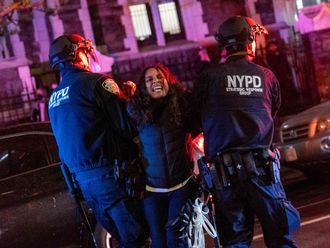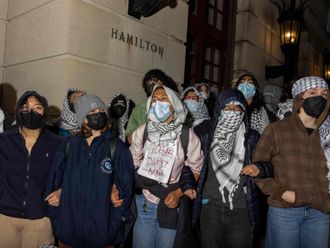BOSTON: For the past few months, the government has used Bill and Denise Richard, and the death of their son Martin, to drive home the heinous and depraved nature of the bombings at the 2013 Boston Marathon.
Martin, who was 8, was with his family cheering on the runners when the menacing figure of Dzhokhar Tsarnaev entered the picture. Videos shown in court showed Tsarnaev lurking behind the family for four minutes before a bomb went off, killing Martin.
The government showcased Martin’s death in its opening statement and closing argument at Tsarnaev’s trial. Prosecutors put Bill Richard on the stand. They had the medical examiner describe in excruciating detail what the bomb did to Martin. They showed the jury the burnt clothes Martin had been wearing.
Now, as the government prepares to make its case for why Tsarnaev should be put to death, the Richard family says it has had enough.
In an open letter to the Justice Department, printed Friday on the front page of The Boston Globe, the Richards praised law enforcement and the Justice Department for “leaving no stone unturned” during the first part of the trial, but said now that it had reached the sentencing phase, they wanted the government to stop seeking the death penalty.
“We are in favour of and would support the Department of Justice in taking the death penalty off the table in exchange for the defendant spending the rest of his life in prison without any possibility of release and waiving all of his rights to appeal,” they wrote.
They argued not against the death penalty itself but against what the continued pursuit of it would mean for them — endless appeals, never letting them move on, forcing their two other children “to grow up with the lingering, painful reminder of what the defendant took from them.”
“As long as the defendant is in the spotlight, we have no choice but to live a story told on his terms, not ours,” they wrote. “The minute the defendant fades from our newspapers and TV screens is the minute we begin the process of rebuilding our lives and our family.”
The family all suffered in the explosion: Martin’s little sister, Jane, then 7, lost her left leg; his brother, Henry, then 9, witnessed unfathomable carnage; their mother, Denise, is blind in her right eye; their father, Bill, caught burning shrapnel in his legs, and his eardrums were perforated.
A jury convicted Tsarnaev on April 8 of all 30 counts against him in connection with the bombing, which killed two other people and injured 264 others, many of them grievously.
The government is preparing for the trial’s second phase, which is to begin Tuesday, in which the same jury is to decide whether to sentence Tsarnaev to life in prison or condemn him to death.
In a statement, Carmen M. Ortiz, the US attorney for Massachusetts, gave no indication that the government would drop the death penalty. She said she had discussed the case confidentially with scores of survivors and victims and had listened to their views.
“As the case moves forward,” Ortiz said, “we will continue to do all we can to protect and vindicate those injured and those who have passed away.”
Even if the government rejects the Richards’ plea, the letter might influence the prosecution’s strategy during the death penalty phrase, said Daniel S. Medwed, a law professor at Northeastern University.
“It creates a profound moral question for the prosecution,” he said. “The prosecution does not represent the victims, but out of deference to the Richards’ wishes, should it refrain from relying on the horrific murder of their son in seeking the death penalty?”
A factor that could complicate the government’s decision, he said, is that one of the aggravating circumstances that prosecutors have cited for pursuing the death penalty is that Martin was particularly vulnerable because he was a child.
But a former prosecutor said that despite the Richards’ obvious anguish, the letter was likely to make little difference.
“As far as the Department of Justice is concerned, they are one of a number of victims,” said Jeremy M. Sternberg, a former federal prosecutor and now a partner in the Boston office of the law firm Holland & Knight.
The government is still most likely to have Bill Richard testify, he said, because he would not be discussing the punishment but what happened.
“Bill Richard’s testimony is not to say what sentence he wants, it’s to show the aggravating factors, the extreme atrocity, the impact on innocent people,” Sternberg said.
(STORY CAN END HERE. OPTIONAL MATERIAL FOLLOWS.)
The trial has prompted an unusual outpouring of views on the death penalty here, partly because Massachusetts has abolished it; it is an option now because the bombing is a federal case.
People here overwhelmingly oppose capital punishment; in the city of Boston, 61 per cent want Tsarnaev to be given life in prison, while 26 per cent support the death penalty, according to a poll taken over the weekend for WBUR, a public radio station here.
In the greater Boston area, the anti-death sentiment appears to have grown since Tsarnaev’s conviction last week: 58 per cent of adults want him sentenced to life, up from 49 per cent in March, the poll said, while 31 per cent want him sentenced to death, down from 38 per cent in March.
Marilyn Baker, 78, who lives in Lexington, Massachusetts, and participated in the poll, is among those who supported the death penalty before but now thinks Tsarnaev should be sentenced to life.
“Giving him the death penalty will make him a martyr; it will keep his name out there,” Baker said. “If you just put him under a life sentence, he will fade into oblivion.”
— New York Times Service












